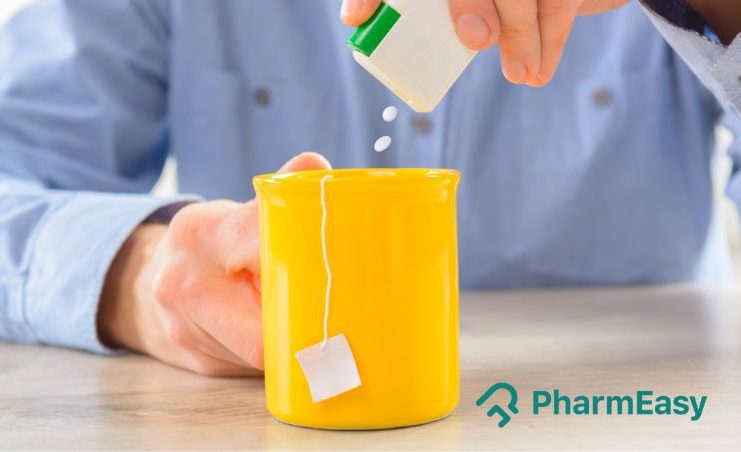Not So Sweet! Facts About Artificial Sweeteners For Weight Loss.
By Saksham Bhatia +2 more

Download PharmEasy App




Register to Avail the Offer
Send OTPBy continuing, you agree with our Privacy Policy and Terms and Conditions
By Saksham Bhatia +2 more
Artificial sweeteners or synthetic sweeteners are sugar substitutes and as the name suggests, they taste just like sugar but contain fewer calories. Some artificial or non-sugar sweeteners (NSS) even have no calories.

Artificial sweeteners are chemicals that are added to foods and beverages to make them taste sweet.
Many people add artificial sweeteners because they believe that NSS are healthier than traditional sugar and will help control body weight.
Lower-calorie and no-calorie sweeteners will not necessarily make a food or drink healthy but can be helpful in reducing your sugar intake.
NSS is primarily consumed by people with diabetes and those who are trying to lose weight.
Some popular artificial sweeteners are:
Table of Contents
If you have been using NSS because you believe that this low-calorie sweetener will not add to your weight, you need to know what WHO has recently discovered. The World Health Organisation has released a report that states that artificial sweeteners should not be used to control weight gain and do not help in mitigating the chances of diet-linked non-communicable diseases.
The guideline against using NSS applies to everyone who is not diabetic but has been using NSS as part of their diet plan to lose weight. This guideline does not apply to people with diabetes.
As per WHO studies, it has been found that artificial sweeteners do not have any long-term benefits in terms of reducing body fats or weight. In fact, people often tend to assume that a meal or dessert prepared with artificial sweeteners is healthy and low in calories. This is not true in all cases; if the preparation itself has high-calorie ingredients, using artificial sweeteners will not make it healthier. The reason behind this is that artificial sweeteners do not have any nutritional value and are not essential as a part of a daily diet.
People who want to reach a healthy weight target should strive to reduce added sugar consumption as much as possible. The addition of whole fruits, grains, millet, vegetables, proteins, healthy fats in moderation and unsweetened beverages can be a healthier choice when combined with adequate exercise on a routine basis.
Excessive use of artificial sweeteners can cause long-term harm, especially for people who are not diabetic and are consuming it with the intent to lose weight. Any food that comes with a “sugar-free” tag is not necessarily low in calories or healthy. Be mindful of what you are eating, how much you are eating and how frequently?
The WHO guideline does not apply to hygiene products like toothpaste, skin cream and medications which contain non-sugar sweeteners.
People on a weight loss journey. Start cutting off added sugars (in all forms) gradually so that your taste buds can adapt to the change. This will help you reach a sustainable eating goal.
Also Read: Turbinado Sugar: Understanding Its Health Impact and Uses
Also read: Chamoy Benefits: A Research-Backed Health And Flavour Guide
Disclaimer: The information provided here is for educational/awareness purposes only and is not intended to be a substitute for medical treatment by a healthcare professional and should not be relied upon to diagnose or treat any medical condition. The reader should consult a registered medical practitioner to determine the appropriateness of the information and before consuming any medication. PharmEasy does not provide any guarantee or warranty (express or implied) regarding the accuracy, adequacy, completeness, legality, reliability or usefulness of the information; and disclaims any liability arising thereof.
Links and product recommendations in the information provided here are advertisements of third-party products available on the website. PharmEasy does not make any representation on the accuracy or suitability of such products/services. Advertisements do not influence the editorial decisions or content. The information in this blog is subject to change without notice. The authors and administrators reserve the right to modify, add, or remove content without notification. It is your responsibility to review this disclaimer regularly for any changes.
Comments